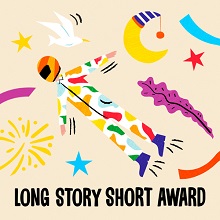I was born, Mom says, dollhouse-
ready, pre-Barbie hair a field
of curls, the early bird that
...
[+]
What the world did not know was that she had an irrational fear of using her voice. Her least favorite thing was when someone would lean in toward her, cup his ear, and say, “Sorry?” She squirmed whenever she had to repeat herself.
Around the time Logan Shu started reading Faulkner and astronauts’ memoirs, she wrecked her car. The car was her dad’s, a Nissan Rogue. We’d just come out of the mall. Logan Shu took out a speaker she’d just bought and put on a song with a loud saxophone.
“You ever nervous? Being responsible for another person’s life?” I said. Teased, more than anything.
“A little.” I could tell she didn’t really mean it. Her head was somewhere else, not exactly in the clouds, but in the sharp angles where the sun glanced off of reflective surfaces.
We sat for a while at the exit of the parking lot, the Rogue ticking a steady turn signal. The mechanical heartbeat drove us into a lull. Logan pulled out of the lot—and then a dump truck sideswiped us.
The lines separating the lanes were faded away, a friend would later say in defense of the way Logan steered into a too-wide turn and rammed the passenger-side hood into the truck’s belly.
In immediacy, everything seemed dustier, like radioactive ash had finely coated the inside of the Rogue. A ringing sound, the smell of something burnt. Placidly, I noticed I was bleeding.
“Well, fuck,” one of us said.
A saxophone trilled. Logan turned the speaker off. The Rogue rattled off the road and into a gas station.
Bystanders opened the doors for us. Police came with papers for Logan. She was unhurt. I signed a paper refusing paramedics. Logan called her dad. I called some friends who’d just left the mall. Logan called her dad again. No answer. Then the local news came.
Under pressure, Logan reverted to childish instincts. She shuffled behind a utility pole. Didn’t say anything, just cried. It seemed selfish of her to cry, but I hugged her, stroked her hair, taking care not to get blood on her.
She seemed so small. I’d never lost respect for someone in such a strange way.
After the accident, I tried to reconstruct Logan Shu in the moments before her death. Would her hands have been sweating? Did she pray? Did she look death in the eye and curse it?
I had trouble believing it was the last one, as much as I tried. I could only see her crying, in the way she had after that first accident, small and alone in the atmosphere.
Logan Shu thrived on being misread. Others thought her social discomfort cute. “People say to be yourself,” she once said when we were alone. “But what if you’re not what everyone expects you to be?”
“Then be what they expect,” I said.
“What do you mean?”
“Does everything have to have a meaning?”
She thought about it. “Yes.”
She must have thought that I was the only one of our friends who came close to understanding her: the real Logan Shu that was struggling to make herself known but frightened by what others would find.
After the accident, I was hit with a horrifying thought: Logan had mistaken my pity for acceptance. She thought I had seen the real Logan Shu and not recoiled. Meanwhile, my pity was slowly morphing into disgust.
At the time of our graduation, I had a girlfriend, and Logan Shu had a widely-known crush on one of our friends. College scattered us, and we didn’t think much of it. Ours was a large friend group, affection distilled among our sheer numbers. My girlfriend ended up one state over, Logan’s crush halfway across the country.
Irony came like a slap in the face. I was going to the same college as Logan—and her alone.
Without parents helicoptering us, we drank, tried drugs. I have few clear memories of those first months. I remember one night sitting in a circle of at least twenty people in someone’s dorm room, passing a dab pen around. Another time, Logan Shu and I were in my room. I think she might have been crying that night. She might also have told me about her mother, whom she’d never had a good relationship with, but I didn’t listen to what she said.
And another time, in Logan’s room. We’d stolen a handle of whiskey from a party, and she’d asked me back to finish it with her.
“I just wonder about things, you know,” she said.
“There are a lot of things.”
“Just things... like.” She looked down, made her Grumpy Cat face, which I was beginning to despise. “Like black holes. What are they?”
“I’m sure they’d like you to know.”
“What does that even mean?”
“You’re always asking that,” I said, and because I didn’t want to hear her talk anymore, I kissed her.
She didn’t protest. I was glad she didn’t have any experience because I only had a little. I slotted my fingers into Logan Shu. She was warm, pale, plump, slightly sweaty. I didn’t like the feeling of her, so I disentangled us and made her put her mouth on me.
Logan Shu neither complained nor asked questions; she was often the one to ask me back to her room, drunk or high, and then it was suddenly morning, and I woke in her bed with a deep-seated loathing.
Those months I spent with Logan Shu were the worst I’ve had. But in the midst of them, I didn’t understand the bleakness. It was like a black hole—incomprehensible.
Eventually, I discovered it. Logan Shu was the cause of the idleness, the bad sex, and above all the accident, which was the cause of my distress. Thus, Logan Shu was the cause of my distress. I had used her as a crutch, and now she was digging into my side. It was time to put familiarity behind and focus on my future.
I was so focused on proving this point to myself that I didn’t think anything of it when Logan Shu made me ramen on my birthday and served it to me in her best bowl. It was the expensive kind of ramen, too. Shrimp flavored, maybe.
“Thanks,” I said. “I don’t think we should hang out anymore.”
“What do you mean?”
I hated that question.
“You’re breaking up with me?” she said.
I wasn’t aware there was anything to break.
“If you want to call it that,” I said. “We shouldn’t see each other anymore.”
“What do you mean?” There it was again. The realization came out in a rush of breath. “We were together.”
I looked at her, at her little Grumpy Cat face, the sweaty hands she kept wiping on her shorts.
“No,” I said.
I waited for her to get it. Eventually, she took the bowl of ramen out of my hands and started eating in large, slurping motions. She never looked up, even when I left, hiding her face behind the steam.
It was around this time that my girlfriend broke up with me. I called to ask her about it, and she said, “I can’t believe you’d do that to Logan.” So, I thought, Logan Shu had gone crying again. I hated myself as I thought it, but the thought undeniably lingered in my mind for the following months.
“You’re heartless,” my girlfriend said.
After the accident that killed Logan Shu, her memoir sold like crazy. I passed by a bookstore in the mall one day and picked up a copy, read:
In my formative years, I got into a car accident with a friend. I had been driving; the burden was on me. I called my dad several times. No answer. It was then that I accepted my fate. I had only myself to rely on.
And put it back on the shelf.



